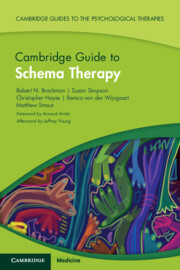Book contents
- Cambridge Guide to Schema Therapy
- Cambridge Guides to the Psychological Therapies
- Reviews
- Cambridge Guide to Schema Therapy
- Copyright page
- Contents
- Foreword
- Preface
- A Note from the Series Editor
- Acknowledgements
- Part I Overview of the Schema Therapy Model
- Part II The Model of Schema Therapy in Practice
- Chapter 3 Schema Therapy Assessment
- Chapter 4 Case Conceptualisation and Mode Mapping in Schema Therapy
- Chapter 5 Envisioning the Road Ahead
- Chapter 6 Intervention Strategies for Schema Healing 1
- Chapter 7 Intervention Strategies for Schema Healing 2
- Chapter 8 Intervention Strategies for Schema Healing 3
- Chapter 9 Intervention Strategies for Schema Healing 4
- Chapter 10 Building Connection to Healthy Modes
- Chapter 11 Bypassing Maladaptive Coping Modes to Support Change
- Chapter 12 Preparing for Termination and the End Phase of Schema Therapy
- Part III Applications and Adaptations for Mental Health Presentations
- Part IV Application of Schema Therapy in Different Populations and in Different Settings
- Appendix Interview Questions/Guidance for the Assessment Process (Chapter 3)
- Index
- References
Chapter 12 - Preparing for Termination and the End Phase of Schema Therapy
from Part II - The Model of Schema Therapy in Practice
Published online by Cambridge University Press: 27 July 2023
- Cambridge Guide to Schema Therapy
- Cambridge Guides to the Psychological Therapies
- Reviews
- Cambridge Guide to Schema Therapy
- Copyright page
- Contents
- Foreword
- Preface
- A Note from the Series Editor
- Acknowledgements
- Part I Overview of the Schema Therapy Model
- Part II The Model of Schema Therapy in Practice
- Chapter 3 Schema Therapy Assessment
- Chapter 4 Case Conceptualisation and Mode Mapping in Schema Therapy
- Chapter 5 Envisioning the Road Ahead
- Chapter 6 Intervention Strategies for Schema Healing 1
- Chapter 7 Intervention Strategies for Schema Healing 2
- Chapter 8 Intervention Strategies for Schema Healing 3
- Chapter 9 Intervention Strategies for Schema Healing 4
- Chapter 10 Building Connection to Healthy Modes
- Chapter 11 Bypassing Maladaptive Coping Modes to Support Change
- Chapter 12 Preparing for Termination and the End Phase of Schema Therapy
- Part III Applications and Adaptations for Mental Health Presentations
- Part IV Application of Schema Therapy in Different Populations and in Different Settings
- Appendix Interview Questions/Guidance for the Assessment Process (Chapter 3)
- Index
- References
Summary
Schema therapy training programmes tend to focus on the starting phases of therapy rather than on the final phase of therapy. In the early phases the therapist plays a more active part in the therapeutic interventions and in providing a role model of a ‘healthy adult’. In these phases, the therapist generates the client’s mode awareness, while also facilitating opportunities for corrective emotional experiences. These experiences will provide a basis for the development of the client’s Healthy Adult mode. However, it should not be assumed that the end phase will always be smooth or problem free. Often, as the therapy approaches the ending phase, challenges emerge and it can be easy for clients to fall back into old behavioural patterns. In these moments clients may seem unable to continue independently without the support of therapy. This chapter discusses the way in which the end phase might be carried out, how the therapeutic stance of limited reparenting changes during this phase, and how the therapeutic strategies are implemented differently as compared to the earlier phases. Further, we will review some common problems and challenging situations schema therapists might encounter in this end phase.
Keywords
- Type
- Chapter
- Information
- Cambridge Guide to Schema Therapy , pp. 241 - 250Publisher: Cambridge University PressPrint publication year: 2023

